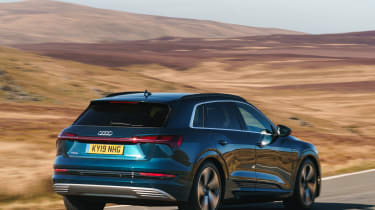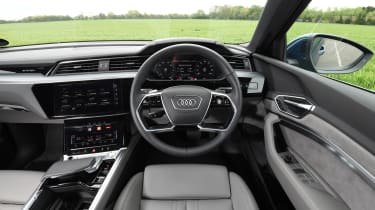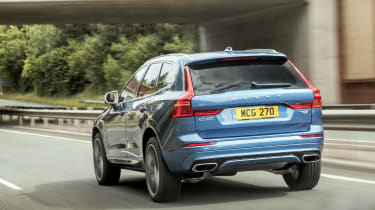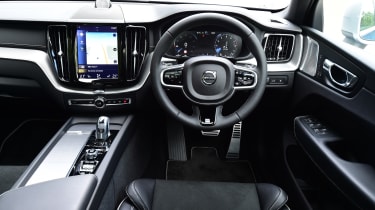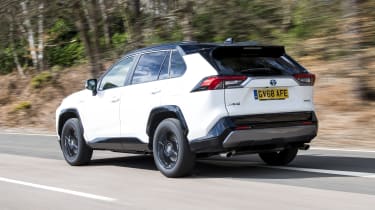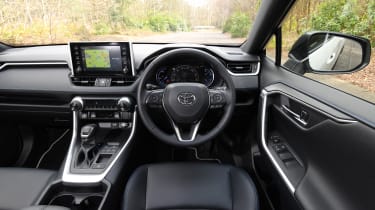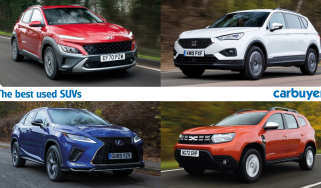Top 3 low-emission SUVs for £500 a month
“Dear Carbuyer, I want a low-emission SUV that is family friendly and well-equipped. What does £500 a month buy me?”
You’ve got £500 a month for a low-emission SUV but which one should you pick? While an array of conventional SUV models are offered by manufacturers in the UK, only a handful of models on sale can claim to be genuinely low-emission.
Until recently, low-emission SUVs were only available in the shape of expensive cars such as the Tesla Model X and Range Rover PHEV. Now a number of less expensive models have started to arrive in showrooms, with the electric Kia e-Niro and Toyota C-HR hybrid proving popular with buyers.
Best hybrid cars and plug-ins to buy
Typically, low-emission SUVs can be split into three distinct types, with most emitting between 0g/km to around 130g/km of CO2. Pure-electric models such as the Hyundai Kona electric are the cleanest, powered by an electric motor and rechargeable battery pack, producing a 0g/km CO2 emissions figure. Hybrid models, including the Honda CR-V Hybrid, combine a conventional petrol engine with a small electric motor that assists the engine and provides pure electric running over short distances.
The third type is the plug-in-hybrid (PHEV), which also combines a petrol engine with an electric motor, but with the addition of a much larger battery pack that can be charged via a charging point. In models such as the MINI Countryman Cooper SE ALL4 PHEV, this larger battery pack gives around 26 miles of pure-electric driving range, a far greater distance than any hybrid model, which helps lower its CO2 emissions figure to 49g/km.
Nearly all low-emission SUVs are derivatives of standard models that sit close to or at the top of their respective model ranges, meaning they are very well-equipped with all of the latest technology, such as large infotainment screens and driver safety aids including automatic emergency braking.
They’ll be practical too, with all of the interior space you’d get from a conventional SUV, as well as a raised ride height and high driving position for a good view of the road ahead. Most will incorporate battery packs under their boot floors, which, thanks to improved packaging, has minimal impact on available boot space.
Other benefits include low running costs, with hybrid models capable of achieving 40-50mpg or more. Plug-in hybrid models improve on this further still, with manufacturers claiming some models are capable of over 100mpg or more.
For a monthly budget of £500 a month, you can pick from the recent crop of models, from conventional hybrids all the way up to the latest range-topping electric SUVs.
Top 3 low-emission SUVs for £500 a month
Audi e-tron: The pure-electric choice
For: Looks like any other Audi; smooth and refinedAgainst: Heavy, high power consumption
If you’re willing to sacrifice the convenience for regular visits to a petrol station for zero-emission motoring, the Audi e-tron is an attractive purchase. The brand’s first all-electric model has, overall, been well executed, with a spacious cabin, plenty of ground clearance, four-wheel drive and a huge boot.
Its 95kWh battery offers a claimed range of 249 miles. This could deter buyers who often cover long distances, but a reasonably quick top-up time helps. An 80 per cent charge takes around 90 minutes with a 50kWh rapid charger.
The e-tron’s high-quality cabin has swathes of leather and metal trim, two well-bolstered, electrically-adjustable sports seats and a dual-screen infotainment system from the A8. The layout doesn’t quite live up to the hi-tech drivetrain, though.
Only one powertrain is offered in the e-tron, with a pair of electric motors providing a maximum of 402bhp and 664Nm of torque. The Audi EV has a 0-62mph time of 5.7 seconds and a top speed of 124mph. A soft throttle pedal means smoother, but more sluggish, progress than in a Tesla Model X.
Volvo XC60 T8: The plug-in choice
For: Understated style, comfort, safetyAgainst: Needs regular charges to match mpg claims
Handsome looks inside and out make the XC60 T8 an attractive SUV. The plug-in hybrid’s official 49g/km CO2 emissions make it a good choice for company car buyers. Keep the 10.4kWh battery charged and, thanks to a 28-mile electric range, it returns around 130mpg in official tests.
While the XC60 is practical enough for most drivers, the Volvo is not the most spacious car in its class. It's 505-litre boot volume is 75 litres down on the Toyota RAV4’s, and 100 litres less than the Audi e-tron’s.
Volvo only offers the XC60 T8 in range-topping Inscription Pro and R-Design Pro trims. Both specs offer leather upholstery, a multifunction steering wheel, automatic climate controland a nine-inch, tablet-style portrait infotainment system.
Under the bonnet the T8 combines a 2.0-litre four-cylinder petrol engine and an electric motor for a combined output of 400bhp. Its 0-62mph time of 5.2 seconds and top speed of 140mph are the best of this trio. The combination of turbo and supercharging, plus electric power, makes some entertaining noises, too.
Toyota RAV4: The budget choice
For: Affordable, good build quality, smooth drivetrainAgainst: Lacks premium image, poor infotainment
The Toyota RAV4 might not have a premium badge, but it’s considerably cheaper to buy or lease. Despite having the smallest battery here, emissions remain low, at 102g/km of CO2 for the front-wheel-drive model. The RAV4 sits in the 21 per cent Benefit-in-Kind company car tax bracket.
A four-wheel-drive variant is available, with slightly poorer CO2 emissions of 105g/km. Economy is reasonable across the range, with the two-wheel-drive car returning 48.7mpg and the AWD model averaging 47.8mpg.
Even though it’s cheaper than the e-tron and XC60, the RAV4’s cabin is well equipped, featuring automatic climate control and digital instruments. But the infotainment system is clunky and lacks support for Apple CarPlay and Android Auto.
Toyota’s 2.5-litre four-cylinder petrol-hybrid offers 219bhp and 221Nm of torque in the four-wheel-drive model. Its performance and practicality are reasonable, with a 0-62mph time of 8.1 seconds and a maximum braked towing weight of 1,650kg. The CVT gearbox won’t be to all tastes, though.
Recommended
Most Popular
Tips & advice

Car dashboard warning lights: what does each symbol mean?

Electric car charging stations: public networks, charger types, apps and maps



